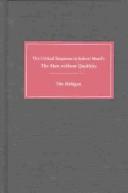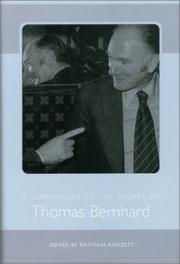| Listing 1 - 6 of 6 |
Sort by
|

ISBN: 1571131175 9786611862817 1281862819 1571136150 9781571136152 9781571131171 Year: 2003 Publisher: Rochester, N.Y. Camden House
Abstract | Keywords | Export | Availability | Bookmark
 Loading...
Loading...Choose an application
- Reference Manager
- EndNote
- RefWorks (Direct export to RefWorks)
The Austrian writer Robert Musil ranks among the foremost novelists of the 20th century. Despite a series of lesser but well-regarded shorter works, his literary reputation rests almost entirely on his novel 'Der Mann ohne Eigenschaften' (The Man without Qualities), a life-work in the truest sense, which became the focus of all his energies and thinking from 1924 until his death in 1942. This study analyzes the principal trends in scholarship on the novel from the 1960s to the present. It contrasts earlier criticism, which foregrounded the eponymous central character's search for identity against the background of subject theory or mysticism, with more recent criticism, which has focused on aesthetic and ethical approaches to the novel within the broader context of theories of value. A focal chapter in the study centers on the persistent difficulty critics have encountered with the idea of 'Eigenschaftslosigkeit', the state of being without qualities named in the novel's title. Tim Mehigan is Associate Professor of German and Head of the Department of Germanic Studies and Russian at the University of Melbourne.
Musil, Robert --- Musil, Robert, --- LITERARY CRITICISM / European / German. --- 20th Century. --- Aesthetics. --- Austrian Writer. --- Ethics. --- Identity. --- Literature. --- Robert Musil. --- The Man without Qualities.
Book
ISBN: 3900424284 9783900424282 Year: 2001 Publisher: Linz : Adalbert Stifter Institut,
Abstract | Keywords | Export | Availability | Bookmark
 Loading...
Loading...Choose an application
- Reference Manager
- EndNote
- RefWorks (Direct export to RefWorks)
Book
Year: 2016 Publisher: Böhlau
Abstract | Keywords | Export | Availability | Bookmark
 Loading...
Loading...Choose an application
- Reference Manager
- EndNote
- RefWorks (Direct export to RefWorks)
The monograph explores the life, work and legacy of the Austrian writer, director and producer Ernst Lothar (1890–1974) through the analysis of hitherto unpublished correspondence as well as other unpublished writings/documents from his estate, giving ample consideration to the reception of Lothar’s oeuvre. "Die eine Hälfte meines Lebens habe ich meinen erzählenden Schriften, die andere dem Beamtentum und der Kritik, mein ganzes aber dem Theater gewidmet", hält Ernst Lothar (1890-1974) im Alter von 65 Jahren fest. Zwei Weltkriege, Flucht und achtjähriges Exil liegen da bereits hinter ihm, eine gescheiterte Ehe und der Tod seiner beiden Töchter. Den größten Teil des 20. Jahrhunderts aber durchlebte er "inmitten des Theater- und Literaturbetriebs, vielfach in leitender Stellung, immer im Brennpunkt der künstlerischen und geistigen Entscheidungen". Basierend auf der unveröffentlichten Korrespondenz und anderen Materialien aus dem Nachlass werden Leben, Wirken und Werk des österreichischen Autors und Theatermannes vorgestellt, wobei die Rezeption seiner Arbeiten einen breiten Raum einnimmt.
Critics --- Theater --- Criticism --- Authors, Austrian --- austrian writer --- unpublished manuscripts & correspondences --- literary influences & relationships --- reception --- emigration --- theatre --- österreichischer Schriftsteller --- unveröffentlichte Werke und Korrespondenz --- literarische Einflüsse und Beziehungen --- Rezeption --- Emigration --- Theater --- Ernst Lothar --- Köln --- Weimar --- Wien --- Production and direction --- History --- History --- Lothar, Ernst, --- Criticism and interpretation. --- austrian writer --- unpublished manuscripts & correspondences --- literary influences & relationships --- reception --- emigration --- theatre --- österreichischer Schriftsteller --- unveröffentlichte Werke und Korrespondenz --- literarische Einflüsse und Beziehungen --- Rezeption --- Emigration --- Theater --- Ernst Lothar --- Köln --- Weimar --- Wien

ISBN: 1571132163 9781571132161 9781571136060 1571136061 Year: 2002 Volume: *10 Publisher: Rochester, NY : Camden House,
Abstract | Keywords | Export | Availability | Bookmark
 Loading...
Loading...Choose an application
- Reference Manager
- EndNote
- RefWorks (Direct export to RefWorks)
Since the death of Thomas Bernhard in 1989, the literary reputation of this complex and unique writer has risen to the point that he is now regarded as a major European figure. Bernhard emerged in the 1960s as one of Austria's major writers, challenging the popularity of such established writers as Heinrich Böll and Günter Grass on the German literary scene. His idiosyncratic prose consists of a tragic-comic blend of themes such as suicide, madness, and isolation combined with highly satirical and histrionic invectives against culture, tradition, and society. As a skillful impresario of public scandals by means of verbal assaults upon Austrian elite culture, Bernhard also earned himself the epithet of Übertreibungskünstler (artist of exaggeration). In this art of cultural and political provocation Bernhard remains unmatched to the present day. This volume of essays provides contributions by well-known critics that examine the most salient aspects of Bernhard's work, offering insights into literary strategies and public themes that made Bernhard one of Europe's masters of modern prose and drama. Essays examine Bernhard's complex artistic sensibility, his impact on Austria's critical memory, his relation to the legacy of Austrian Jewish culture, his representative value as Austria's prime literary export, and his cosmopolitanism and its significance for the rapidly changing multicultural landscape of Europe. Matthias Konzett is Associate Professor of German at Yale University. He is the author of The Rhetoric of National Dissent in Thomas Bernhard, Peter Handke, and Elfriede Jelinek (Camden House, 2000).
Bernhard, Thomas --- Criticism and interpretation --- Criticism and interpretation. --- Berŭnharŭtʻŭ, Tʻomasŭ --- Bernhard, Nicolaas Thomas --- Berncharnt, Tomas --- ברנהרד, תומס --- トーマス・ベルンハルト --- Fabian, Thomas --- Austrian literature --- History and criticism. --- Austrian writer. --- Cosmopolitanism. --- Cultural and political. --- Culture. --- Drama. --- Europe. --- Histrionic. --- Isolation. --- Literary export. --- Madness. --- Modern prose. --- Multicultural landscape. --- Political provocation. --- Satirical. --- Suicide. --- Thomas Bernhard. --- Tradition. --- Authors, Austrian
Book
Year: 2016 Publisher: Böhlau
Abstract | Keywords | Export | Availability | Bookmark
 Loading...
Loading...Choose an application
- Reference Manager
- EndNote
- RefWorks (Direct export to RefWorks)
The monograph explores the life, work and legacy of the Austrian writer, director and producer Ernst Lothar (1890–1974) through the analysis of hitherto unpublished correspondence as well as other unpublished writings/documents from his estate, giving ample consideration to the reception of Lothar’s oeuvre. "Die eine Hälfte meines Lebens habe ich meinen erzählenden Schriften, die andere dem Beamtentum und der Kritik, mein ganzes aber dem Theater gewidmet", hält Ernst Lothar (1890-1974) im Alter von 65 Jahren fest. Zwei Weltkriege, Flucht und achtjähriges Exil liegen da bereits hinter ihm, eine gescheiterte Ehe und der Tod seiner beiden Töchter. Den größten Teil des 20. Jahrhunderts aber durchlebte er "inmitten des Theater- und Literaturbetriebs, vielfach in leitender Stellung, immer im Brennpunkt der künstlerischen und geistigen Entscheidungen". Basierend auf der unveröffentlichten Korrespondenz und anderen Materialien aus dem Nachlass werden Leben, Wirken und Werk des österreichischen Autors und Theatermannes vorgestellt, wobei die Rezeption seiner Arbeiten einen breiten Raum einnimmt.
Critics --- Theater --- Criticism --- Authors, Austrian --- Production and direction --- History --- History --- Lothar, Ernst, --- Criticism and interpretation. --- austrian writer --- unpublished manuscripts & correspondences --- literary influences & relationships --- reception --- emigration --- theatre --- österreichischer Schriftsteller --- unveröffentlichte Werke und Korrespondenz --- literarische Einflüsse und Beziehungen --- Rezeption --- Emigration --- Theater --- Ernst Lothar --- Köln --- Weimar --- Wien
Book
Year: 2016 Publisher: Böhlau
Abstract | Keywords | Export | Availability | Bookmark
 Loading...
Loading...Choose an application
- Reference Manager
- EndNote
- RefWorks (Direct export to RefWorks)
The monograph explores the life, work and legacy of the Austrian writer, director and producer Ernst Lothar (1890–1974) through the analysis of hitherto unpublished correspondence as well as other unpublished writings/documents from his estate, giving ample consideration to the reception of Lothar’s oeuvre. "Die eine Hälfte meines Lebens habe ich meinen erzählenden Schriften, die andere dem Beamtentum und der Kritik, mein ganzes aber dem Theater gewidmet", hält Ernst Lothar (1890-1974) im Alter von 65 Jahren fest. Zwei Weltkriege, Flucht und achtjähriges Exil liegen da bereits hinter ihm, eine gescheiterte Ehe und der Tod seiner beiden Töchter. Den größten Teil des 20. Jahrhunderts aber durchlebte er "inmitten des Theater- und Literaturbetriebs, vielfach in leitender Stellung, immer im Brennpunkt der künstlerischen und geistigen Entscheidungen". Basierend auf der unveröffentlichten Korrespondenz und anderen Materialien aus dem Nachlass werden Leben, Wirken und Werk des österreichischen Autors und Theatermannes vorgestellt, wobei die Rezeption seiner Arbeiten einen breiten Raum einnimmt.
Critics --- Theater --- Criticism --- Authors, Austrian --- Production and direction --- History --- History --- Lothar, Ernst, --- Criticism and interpretation. --- austrian writer --- unpublished manuscripts & correspondences --- literary influences & relationships --- reception --- emigration --- theatre --- österreichischer Schriftsteller --- unveröffentlichte Werke und Korrespondenz --- literarische Einflüsse und Beziehungen --- Rezeption --- Emigration --- Theater --- Ernst Lothar --- Köln --- Weimar --- Wien
| Listing 1 - 6 of 6 |
Sort by
|

 Search
Search Feedback
Feedback About UniCat
About UniCat  Help
Help News
News